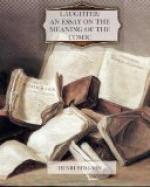An amusing result is likewise obtainable whenever a symbol or an emblem is expanded on its concrete side, and a pretence is made of retaining the same symbolical value for this expansion as for the emblem itself. In a very lively comedy we are introduced to a Monte Carlo official, whose uniform is covered with medals, although he has only received a single decoration. “You see, I staked my medal on a number at roulette,” he said, “and as the number turned up, I was entitled to thirty-six times my stake.” This reasoning is very similar to that offered by Giboyer in the Effrontes. Criticism is made of a bride of forty summers who is wearing orange-blossoms with her wedding costume: “Why, she was entitled to oranges, let alone orange-blossoms!” remarked Giboyer.
But we should never cease were we to take one by one all the laws we have stated, and try to prove them on what we have called the plane of language. We had better confine ourselves to the three general propositions of the preceding section. We have shown that “series of events” may become comic either by repetition, by inversion, or by reciprocal interference. Now we shall see that this is also the case with series of words.
To take series of events and repeat them in another key or another environment, or to invert them whilst still leaving them a certain meaning, or mix them up so that their respective meanings jostle one another, is invariably comic, as we have already said, for it is getting life to submit to be treated as a machine. But thought, too, is a living thing. And language, the translation of thought, should be just as living. We may thus surmise that a phrase is likely to become comic if, though reversed, it still makes sense, or if it expresses equally well two quite independent sets of ideas, or, finally, if it has been obtained by transposing an idea into some key other than its own. Such, indeed, are the three fundamental laws of what might be called the comic transformation of sentences, as we shall show by a few examples.
Let it first be said that these three laws are far from being of equal importance as regards the theory of the ludicrous. Inversion is the least interesting of the three. It must be easy of application, however, for it is noticeable that, no sooner do professional wits hear a sentence spoken than they experiment to see if a meaning cannot be obtained by reversing it,—by putting, for instance, the subject in place of the object, and the object in place of the subject. It is not unusual for this device to be employed for refuting an idea in more or less humorous terms. One of the characters in a comedy of Labiche shouts out to his neighbour on the floor above, who is in the habit of dirtying his balcony, “What do you mean by emptying your pipe on to my terrace?” The neighbour retorts, “What do you mean by putting your terrace under my pipe?” There is no necessity to dwell upon




